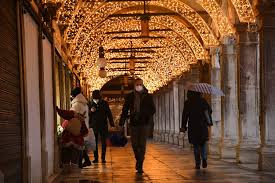Do you still have to quarantine if you arrive in Italy after January 6th?

Rome: Italy says that everyone arriving from overseas between December 21st and January 6th has to quarantine. But what does that mean for people arriving from January 7th onwards?
While overall Italy’s rules are being eased as coronavirus transmission rates fall, the government is imposing extra travel restrictions over Christmas and New Year to discourage unnecessary holidays.
People from most countries outside Europe can only travel to Italy for essential reasons, and while visitors from within the EU or Schengen zone are allowed to enter Italy as tourists, they must test negative for Covid-19 no more than 48 hours before they arrive.
And starting from December 21st, anyone who arrives in Italy from overseas – no matter which country and no matter their nationality – must observe a 14-day quarantine. That rule will remain in place until Epiphany, the traditional end of Italy’s Christmas holidays, on January 6th.
But what happens after that? Could you potentially avoid quarantine by arriving in Italy just one day later?
The latest emergency decree of December 3rd, which set Italy’s Christmas travel rules, states that quarantine applies to everyone who has stayed or transited through another country at any point between December 21st and January 6th (full text here: see article 8, paragraph 7).
As the Interior Ministry subsequently clarified in a circular, that means that people who leave Italy before December 21st or return after January 6th must also quarantine.
In other words, if you return to Italy on or after January 7th having spent part or all of December 21st-January 6th abroad, you will still have to quarantine.
The only exceptions are for people who had to leave Italy for essential reasons, including work, health, study or emergencies. If you left Italy for any other purpose, such as tourism, you’ll have to quarantine whatever your reasons for returning to Italy, the Health Ministry’s website states, since the main purpose of the rule is to put Italian residents off taking a vacation abroad.
There are additional exemptions for cross-border workers, healthcare workers, diplomats and people transiting through Italy via their own transport: find more details here.
The requirement primarily affects people entering Italy from another EU member state, a country in the Schengen zone or the UK, since travellers from these countries would not usually be subject to quarantine.
Arrivals from any other country have to quarantine for 14 days regardless, not only during the Christmas period. Travellers from the UK should also be prepared to find themselves subject to different rules after the Brexit transition period ends on December 31st.
The Local newspaper was alerted to the situation one of our readers, who was advised by an Interior Ministry representative that he would still have to quarantine if he returned to Italy after January 7th.
“I was originally planning on leaving Italy on the 19th of December and returning on the 9th of January but will now have to, unfortunately, return on the 27th of December in order to do the mandatory 14-day quarantine before starting work,” he said.
It is not clear how long the rule will remain in place: Italy’s current decree expires on January 15th, though the government may revise the rules at any point before then.

